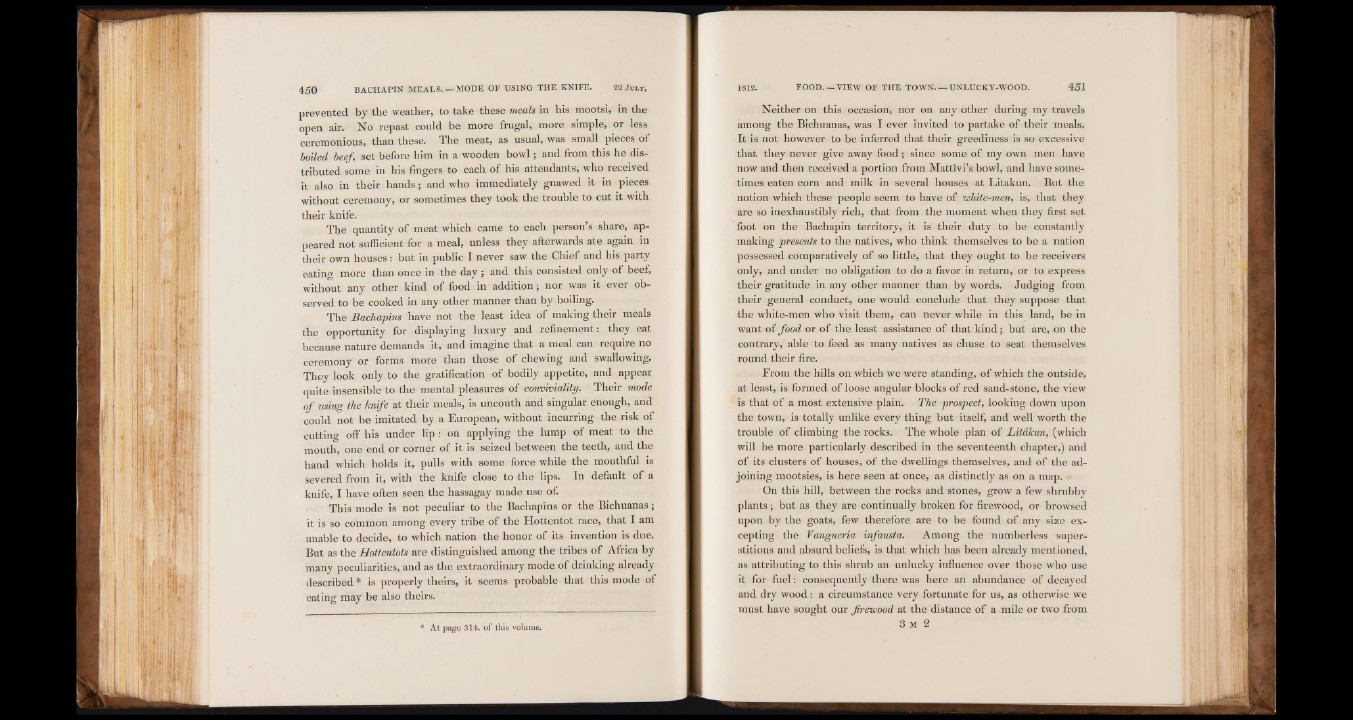
prevented by the weather, to take these meals in his mootsi, in the
open air. No repast could be more frugal, more simple, or less
ceremonious, than these. The meat, as usual, was small pieces of
boiled beef, set before him in a wooden bowl; and from this he distributed
some in his fingers to each of his attendants, who received
it also in their hands; and who immediately gnawed it in pieces
without ceremony, or sometimes they took the trouble to cut it with
their knife.
The quantity of meat which came to each person’s share, appeared
not sufficient for a meal, unless they afterwards ate again in
their own houses: but in public I never saw the Chief and his party
eating more than once in the day ; and this consisted only of beef,
without any other kind of food in addition; nor was it ever observed
to be cooked in any other manner than by boiling.
The Bachapins have not the least idea of making their meals
the opportunity for displaying luxury and refinement: they eat
because nature demands it, and imagine that a meal can require no
ceremony or forms more than those of chewing and swallowing.
They look only to the gratification of bodily appetite, and appear
quite insensible to the mental pleasures of conviviality. Their mode
of using the knife at their meals, is uncouth and singular enough, and
could not be imitated by a European, without incurring the risk of
cutting off his under lip : on applying the lump of meat to the
mouth, one end or corner of it is seized between the teeth, and the
hand which holds it, pulls with some force while the mouthful is
severed from it, with the knife close to the lips. In default of a
knife, I have often seen the hassagay made use of.
This mode is not peculiar to the Bachapins or the Bichuanas;
it is so common among every tribe of the Hottentot race, that I am
unable to decide, to which nation the honor of its invention is due.
But as the Hottentots are distinguished among the tribes of Africa by
many peculiarities, and as the extraordinary mode of drinking already
described * is properly theirs, it seems probable that this mode of
eating may be also theirs.
Neither on this occasion, nor on any other during my travels
among the Bichuanas, was I ever invited to partake of their meals.
It is not however to be inferred that their greediness is so excessive
that they never give away food; since some of my own men have
now and then received a portion from Mattivi’s bowl, and have sometimes
eaten corn and milk in several houses at Litakun. But the
notion which these people seem to have of white-men, is, that they
are so inexhaustibly rich, that from the moment when they first set
foot on the Bachapin territory, it is their duty to be constantly
making presents to the natives, who think themselves to be a nation
possessed comparatively of so little, that they ought to be receivers
only, and under no obligation to do a favor in return, or to express
their gratitude in any other manner than by words. Judging from
their general conduct, one would conclude that they suppose that
the white-men who visit them, can never while in this land, be in
want of food or of the least assistance of that kind; but are, on the
contrary, able to feed as many natives as chuse to seat themselves
round their fire.
From the hills on which we were standing, of which the outside,
at least, is formed of loose angular blocks of red sand-stone, the view
is that of a most extensive plain. The prospect, looking down upon
the town, is totally unlike every thing but itself, and well worth the
trouble of climbing the rocks. The whole plan of Litdkun, (which
will be more particularly described in the seventeenth chapter,) and
of its clusters of houses, of the dwellings themselves, and of the adjoining
mootsies, is here seen at once, as distinctly as on a map.
On this hill, between the rocks and stones, grow a few shrubby
plants; but as they are continually broken for firewood, or browsed
upon by the goats, few therefore are to be found of any size excepting
the Vangueria infausta. Among the numberless superstitious
and absurd beliefs, is that which has been already mentioned,
as attributing to this shrub an unlucky influence over those who use
it for fuel: consequently there was here an abundance of decayed
and dry wood: a circumstance very fortunate for us, as otherwise we
must have sought our firewood at the distance of a mile or two from
3 m 2